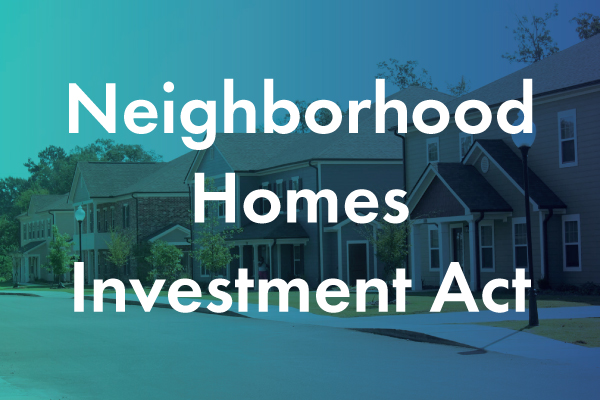Neighborhood Homes Credit / Neighborhood Homes Investment Act
Ask: We ask our MS members of Congress to cosponsor the Neighborhood Homes Investment Act
Key Points on the AHCIA:
- Our nation’s critical affordable housing shortage is not limited to rental housing. According to a recent analysis by Freddie Mac, the United States would need to construct nearly 3.8 million for-ownership homes to meet demand. Moreover, recent dramatic increases in mortgage interest rates have exacerbated the lack of affordability. According to a recent analysis from Black Knight, the average mortgage payment for new home buyers increased 60 percent from July 2021 to July 2023.
- America currently is facing a crucial shortage of affordable ownership housing, making it exceedingly difficult for working families to purchase homes and realize the economic gains and other benefits that come with homeownership.
- Exacerbating this issue are neighborhoods in every state in which homes are in poor condition and property values are too low to support new construction or substantial renovation. The lack of move-in-ready homes makes it difficult to attract or retain home buyers, causing property values to decline.
- The Neighborhood Homes Credit would help break this cycle by providing an incentive for private developers to acquire and rehabilitate homes in distressed neighborhoods by establishing a federal tax credit to cover the gap between the cost of building or renovating homes and the price at which they can be sold, thus making such projects feasible.
- The Neighborhood Homes Credit will help to counter the inflationary pressures impacting working families. Housing costs accounted for more than two-thirds of the 2024 increase in the core Consumer Price Index in 2023, rising 6.2 percent year-over-year. Increasing the supply of affordable ownership homes will cut against these pressures and mitigate home price increases for working families.
- The Neighborhood Homes Credit is based on the Low-Income Housing Tax Credit, a program that has proven a resounding success in utilizing private-sector expertise and public resources to develop much-needed affordable housing.
- The Neighborhood Homes Credit is targeted to help neighborhoods and households who most need the support. The majority of credits would have to be allocated for projects located in neighborhoods with elevated poverty rates, low home values, and low incomes. All homes developed or rehabilitated with the credit would have to be sold to low- and moderate-income households earning 140 percent of the area median income or below who intend to use the home as their primary residence.
- Assuming an average Neighborhood Homes Credit of $40,000 on each home developed, the Neighborhood Homes Investment Act would lead to $100 billion in development financing that would build and/or substantially rehabilitate 500,000 affordable homes over 10 years. This would create 861,000 jobs and generate $56 billion in wages and salaries and $38 billion in federal, state, and local revenue through taxes and fees.

